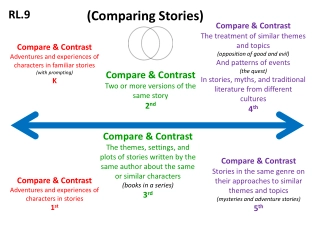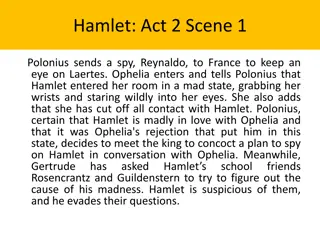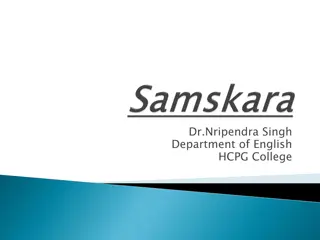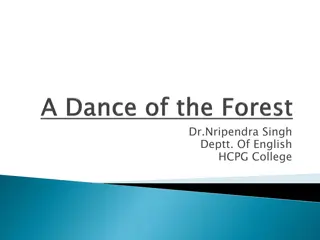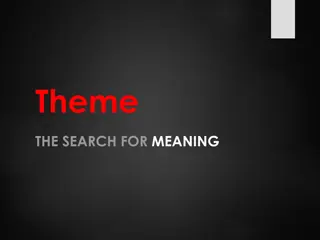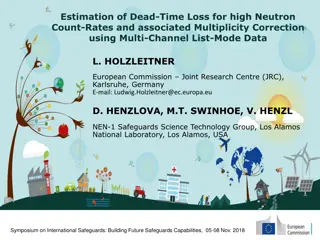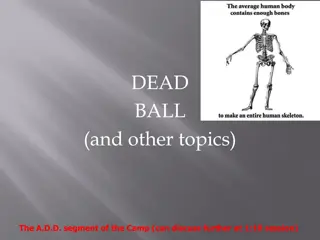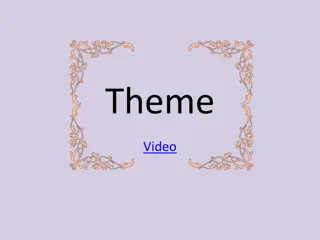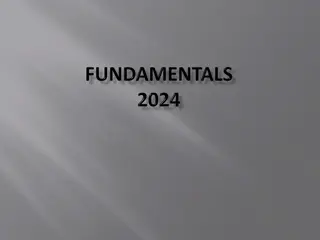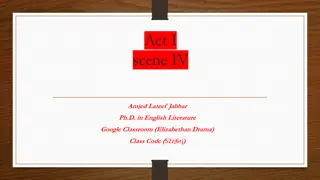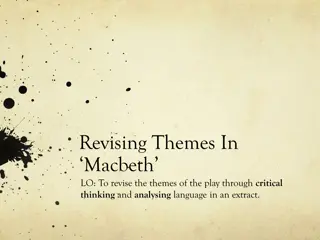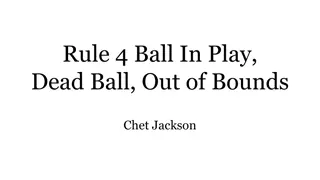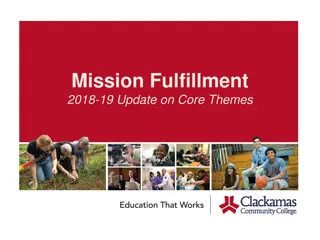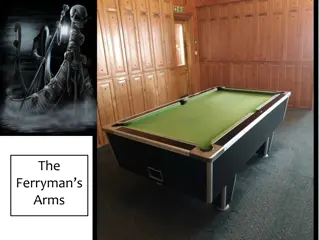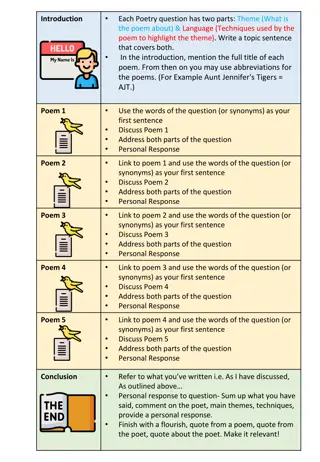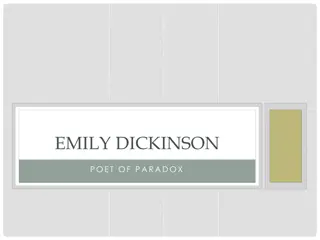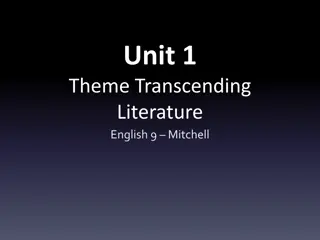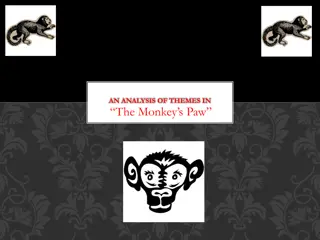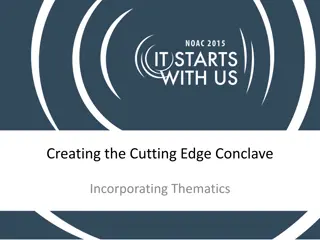Themes and Analysis in Rosencrantz and Guildenstern are Dead
In "Rosencrantz and Guildenstern are Dead," various literary devices such as irony, verbal humor, and syllogisms are utilized to convey the complex themes of fate, identity, and the nature of reality. The characters of Rosencrantz and Guildenstern are explored with a spotlight on their distinguishing traits and roles within the narrative. Additionally, the play's incorporation of elements from "Hamlet," like the scene involving the Player, adds depth and prompts reflection on the nature of performance and perception in the context of the play. Through thought-provoking questions and activities like Verbal Tennis, readers are encouraged to engage critically with the text and consider its implications.
Download Presentation

Please find below an Image/Link to download the presentation.
The content on the website is provided AS IS for your information and personal use only. It may not be sold, licensed, or shared on other websites without obtaining consent from the author.If you encounter any issues during the download, it is possible that the publisher has removed the file from their server.
You are allowed to download the files provided on this website for personal or commercial use, subject to the condition that they are used lawfully. All files are the property of their respective owners.
The content on the website is provided AS IS for your information and personal use only. It may not be sold, licensed, or shared on other websites without obtaining consent from the author.
E N D
Presentation Transcript
Reading Log Questions: Rosencrantz and Guildenstern are Dead
The Infinite Monkey Theory (page 13) What Guildenstern is referring to:
QUESTION ONE: (Bottom of page 15) Note ALL examples of irony or verbal humor you noticed in pages 11-15. What effect is created by this humor?
Syllogisms (page 16): What is a syllogism?
QUESTION TWO: ( page 19) What distinguishes Rosencrantz from Guildenstern? (In other words, are they different, and, if so, how?)
QUESTION THREE: (page 28 The PLAYER turns away.) What do you make of the PLAYER? What does he seem to be saying about acting?
Thirty-Eight (page 33) Why 38?
QUESTION FOUR: (bottom of page 37) What do you think of this scene from Hamlet? (Why THAT scene? Will it change or affect the play in any way?) Does it make sense that Stoppard does this? Why or why not?
DISCUSSION: (page 39) Throughout the play, Rosencrantz and Guildenstern repeat this line from The Lord s Prayer: Give us this day our daily bread, EXCEPT they change the word bread to another word. What is the significance of this?
Verbal Tennis: Lets Play 3 volunteers: Two contestants and a referee. THE RULES: NO statements. NO repetition. No rhetorical questions. No non sequiturs (a question that doesn t naturally follow). NO synonyms.
QUESTION FIVE (page 53): What do you think so far? (Like it? Hate it? etc.) Summarize your thoughts about Act One.
Discussion: (page 59) How might all of these references to direction be symbolic?
Reading Log Question 6: (page 64, after the Player s long speech) What is the Player saying about acting ? Is he right? Why or why not?
Discussion (bottom of page 66): Name some of the puns from this scene. What is the effect of these puns?
Reading Log Question 7: (pages 70-71, Ros s long speech) What is Rosencrantz saying about death ? Does he have a valid point? Why or why not?
Discussion: (page 80) Is the Player right? Does tragedy really involve no choice ?
Reading Log Question 8: What do you think of Guildenstern s definition of death ? How does it compare to Rosencrantz s? (from Reading Log Question 7, page 71)
Discussion (page 90, before Hamlet enters): Is this scene merely slapstick humor, or is Stoppard making a point?
Reading Log Question 9 (end of Act 2): Based on your reading thus far, is this play MOSTLY existential ( Life only has meaning based on your individual choices. ) or MOSTLY absurdist ( Life has no meaning, so don t even bother trying to figure it out. )? Explain your choice.
Reading Log Question 10 (end of play): Your final thoughts: What is Stoppard s purpose in writing this play? How does that purpose relate to Hamlet?
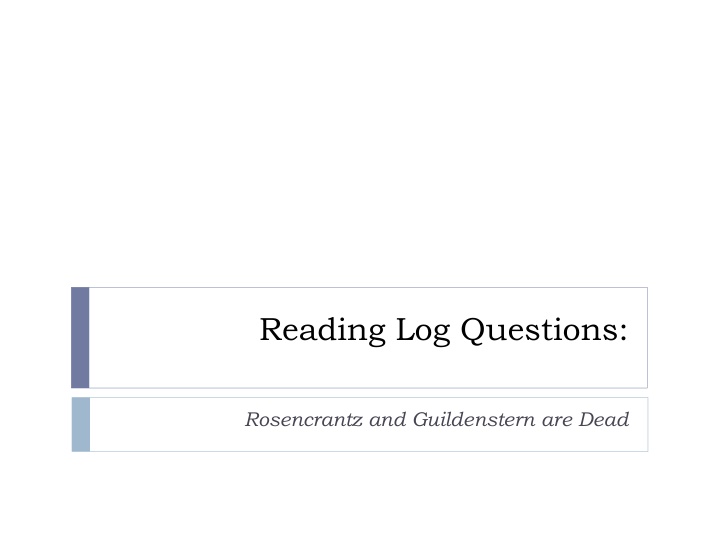

![READ⚡[PDF]✔ Yup I'm Dead...Now What? The Deluxe Edition: A Guide to My Life Info](/thumb/20463/read-pdf-yup-i-m-dead-now-what-the-deluxe-edition-a-guide-to-my-life-info.jpg)
